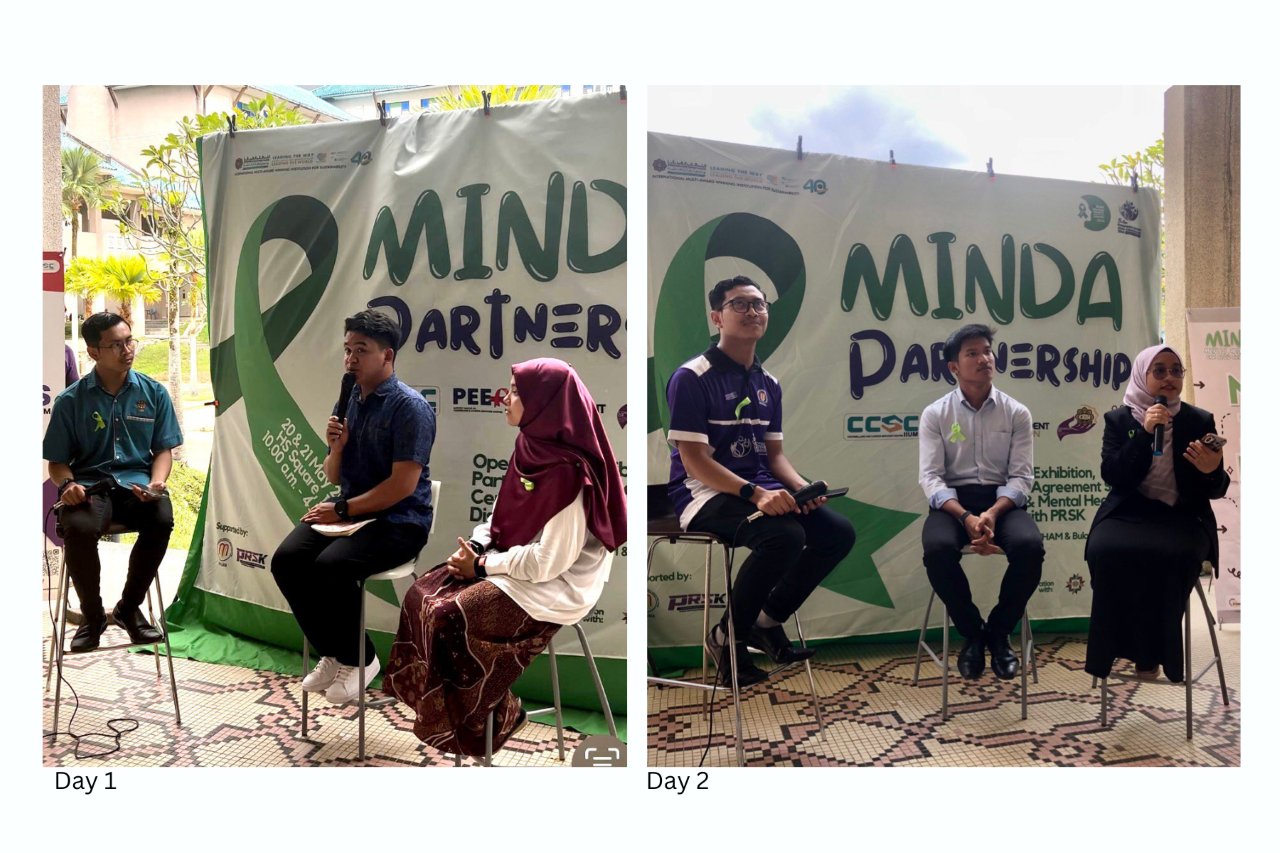By: Sarah Nur Safiyyah and Nor Asfarina Syakirin
GOMBAK, 24 May 2024: The Counselling & Career Services Centre (CCSC) and IIUM Gombak Peers organised a Mental Health Discourse event of two sessions for two days, featuring distinguished guests from various universities.
The first session was held on 20 May (Monday) in which the organisers invited guests from UiTM Shah Alam: first, was the Vice President of Peer Support Leaders (Peers) Universiti Teknologi Mara (UiTM) and Deputy Head of the Central Zone PRSK 24/25, Mohamad Sollahuddin Ikram Bin Mohd Zaini; and Chairperson of IIUM’s Secretariat of Psychology (PSYCSTA), Amanina Hussaini Binti Dzulkeflee.
In the first session, the moderator who is the President of IIUM Gombak Peers, Imad Hassan Basri Abdul Halim, asked each speaker to explain how recent events and issues have been affecting students today.
Ikram emphasised that the COVID-19 pandemic has significantly increased the awareness of mental health issues among students in Malaysia coupled with a 21 percent rise in suicide cases from 2021 to 2022. In view of this, universities are prioritising students’ mental health by organising various activities and counselling programs. These initiatives include training students to act as gatekeepers, connecting their peers with professional help, and highlighting the critical need for mental health support in academic settings.
“I feel that in today’s changing world, mental health issues are being discussed more frequently than before. We are beginning to recognize that mental health is an important issue that should not be overlooked,” said Amanina Hussaini.
She emphasised that students need to prioritise mental health and physical health such as anxiety, stress and depression. These challenges, impact not only students but also other communities, including families who are facing financial difficulties and confinement.
In the second session, the moderator asked the guest speaker whether social media platforms play a role in mental health. Ikram answered, “Social media is like a double-edged sword; it can be helpful but also harmful.” It has played a big role in spreading awareness about mental health issues and suicide prevention. In Malaysia, we need a better support system to reduce suicide rates.
On the other hand, Amanina highlighted that social media is a weapon and it depends how you use it. For example, she illustrated that the issue in Gaza is constantly depicted on social media, and it is hard to ignore. People in Gaza cannot escape the tragedy happening to them, which has opened everyone’s eyes to global issues, not just the ones in Malaysia or at the IIUM.
On second day of the Mental Health Discourse on 21 May (Tuesday), two guests expressed their view: President of PEERS Leaders UPNM & Head of the Central Zone National PRS, Muhammad Zikri Bin Zainudin, and President of Buddies Universiti Malaya (UM) & Secretary General of National PRS, Fatin Umairah Binti Mohd Nasir.
The moderator asked the guests on their opinions regarding netizens who preferred to talk about their mental health issues on social media instead of seeking help from professionals.
Zikri highlighted that creating content for videos regarding mental illness is a serious problem since people that are not aware mental health issues might see them as a small matter and not a serious one.
While Fatin emphasised that during the old days, people who were diagnosed with mental illness cannot go to work and their sickness cannot be cured. Fatin firmly said, “Mental health issues can be cured with the proper treatment from the right sources.” She also added that if one person makes videos about his or her mental health for the public, as viewers, we need to see from different perspectives in terms of the needs of the particular person; maybe they need attention from their family and friends
For the second question, the moderator asked the guests about their experiences of helping friends who were diagnosed with mental health issues.
“Tough guys cry too,” said Zikri. During the sharing session, he said that as a student from Universiti Pertahanan Nasional Malaysia (UPNM), the public see them as tough guys but they are human too. Zikri also added that his friends witnessed one of their team members crying due to the stress of having heavy workloads. He also said that when you face this kind of situation, instead of forcing them to tell their problems, it is better to give them some space until they are ready to share them.
Fatin also experienced a similar situation when one of her friends with an excellent academic background and coming from a well-off family was diagnosed with a mental health issue. “She is pretty, smart and rich but she was diagnosed with bipolar disorder. This is what we do not see, despite having a perfect life in the public eye. Behind closed doors, there is medication that she needs to take, and a psychiatrist that she needs to see for medical check-ups,” Fatin added.
If students are struggling and seeking for help, they can reach out to the Counselling and Career Services Center IIUM;
Number: 03-64214409
Email: ccsc@iium.edu.my***
